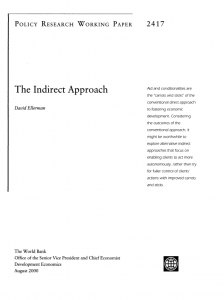 Aid and conditionalities are the “carrots and sticks” of the conventional direct approach to fostering economic development. The economic theory of agency is the most sophisticated theoretical treatment of the direct carrots and sticks approach to influencing human behavior. In view of the outcomes of the conventional approach, it might be worthwhile to explore alternative indirect approaches that focus on enabling clients to act more autonomously rather than overriding or undercutting the clients’ actions (or “agents’ behavior”) with improved “carrots and sticks.” Are there inherent limitations on the direct approach that will not be solved with better crafted “agency contracts” or closer monitoring of the agents? This paper traces the intellectual history of indirect approaches from Socrates to modern thinkers such as Wittgenstein, Gandhi, and McGregor. One of themes is that constructivist and active learning pedagogies constitute an indirect approach wherein the teacher does not directly transmit knowledge to the learner through training and instruction. These pedagogies translated into social and economic development viewed as learning-writ-large form the basis for an alternative indirect approach to fostering development. The one-sentence epigraph for the indirect approach was given by John Dewey: “The best kind of help to others, whenever possible, is indirect, and consists in such modifications of the conditions of life, of the general level of subsistence, as enables them independently to help themselves.” This paper is available as a World Bank Policy Research Working Paper.
Aid and conditionalities are the “carrots and sticks” of the conventional direct approach to fostering economic development. The economic theory of agency is the most sophisticated theoretical treatment of the direct carrots and sticks approach to influencing human behavior. In view of the outcomes of the conventional approach, it might be worthwhile to explore alternative indirect approaches that focus on enabling clients to act more autonomously rather than overriding or undercutting the clients’ actions (or “agents’ behavior”) with improved “carrots and sticks.” Are there inherent limitations on the direct approach that will not be solved with better crafted “agency contracts” or closer monitoring of the agents? This paper traces the intellectual history of indirect approaches from Socrates to modern thinkers such as Wittgenstein, Gandhi, and McGregor. One of themes is that constructivist and active learning pedagogies constitute an indirect approach wherein the teacher does not directly transmit knowledge to the learner through training and instruction. These pedagogies translated into social and economic development viewed as learning-writ-large form the basis for an alternative indirect approach to fostering development. The one-sentence epigraph for the indirect approach was given by John Dewey: “The best kind of help to others, whenever possible, is indirect, and consists in such modifications of the conditions of life, of the general level of subsistence, as enables them independently to help themselves.” This paper is available as a World Bank Policy Research Working Paper.
Click here to download the paper.